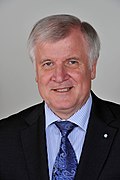15 September 2013 | |||||||||||||||||||||||||||||||||||||||||||||||||||||||||||||||||
All 180 seats in the Landtag of Bavaria 91 seats needed for a majority | |||||||||||||||||||||||||||||||||||||||||||||||||||||||||||||||||
|---|---|---|---|---|---|---|---|---|---|---|---|---|---|---|---|---|---|---|---|---|---|---|---|---|---|---|---|---|---|---|---|---|---|---|---|---|---|---|---|---|---|---|---|---|---|---|---|---|---|---|---|---|---|---|---|---|---|---|---|---|---|---|---|---|---|
| Turnout | 11,812,965 (63.6%) [1] | ||||||||||||||||||||||||||||||||||||||||||||||||||||||||||||||||
| |||||||||||||||||||||||||||||||||||||||||||||||||||||||||||||||||
 Results for the single-member constituencies | |||||||||||||||||||||||||||||||||||||||||||||||||||||||||||||||||
| |||||||||||||||||||||||||||||||||||||||||||||||||||||||||||||||||
The 2013 Bavarian state election was held on 15 September 2013 to elect the 180 members of the 17th Landtag of Bavaria. It was held one week before the 2013 German federal election. The CSU regained the absolute majority it had lost in 2008, while the Free Democratic Party (FDP), a member of the outgoing governing coalition, fell below the 5% electoral threshold and lost all its seats. [2] Minister-President Horst Seehofer continued in office.
Contents
This election was the last election in which a single party got an absolute majority in a state parliament until the 2022 Saarland state election. The CSU previously held an absolute majority, and therefore governed alone, from 1966 to 2008 and again from 2013 to 2018. Previously, even in the late 1990s, it was common that either the CDU/CSU or the SPD got an absolute majority in a state election. For example, this happened in Brandenburg in 1994, 1998 in Lower Saxony and 1999 in Saxony .




